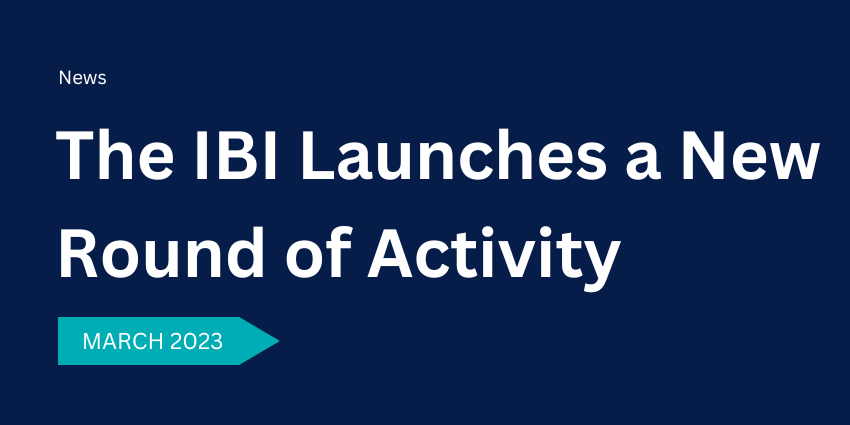The International Brain Initiative launches a new round of activity - with Australia

The International Brain Initiative (IBI) is pleased to announce a new round of efforts to catalyze global collaboration in neuroscience. Established in 2017 with the generous support of the Kavli Foundation, the IBI brings together seven national brain initiatives – Australia, Canada, China, the European Union, Japan, South Korea and the USA – and an extraordinary range of disciplines spanning cellular and molecular neuroscience, neural engineering, humans systems, and neuroethics to realize a shared, global vision of neuroscience impact.
In its first five years, the IBI built an international neuroscience coalition and engaged scientific community. It generated impact through international collaborations among its member nations, global meeting summits and conferences, and publications in prominent journals. Even more importantly, the IBI helped to lead the way to the formalization of new national initiatives in Australia, Canada, and South Korea, alongside the successful renewals of existing ones.
“The IBI Executive Committee reaffirms the importance of collaborative neuroscience and education on a global scale,” says Dr. Judy Illes, new IBI Chair. “We have leveraged expertise in the brain sciences and global investments in billions of dollars, and we are excited to build on this momentum to solve the grand challenges of brain science and engineering.”
The IBI encourages active international engagement in neuroscience through its Working Group structure and emphasis. Through the efforts of the Working Groups, the IBI will focus its efforts in three key areas that promote collaboration and learning, data sharing and governance, and operational and professional excellence.
To promote active collaboration and learning, the IBI is committed to:
- Expanding tools and technology dissemination with greater geographic, gender, and cultural representation and methods, clear mission-oriented goals, and an actionable roadmap; exploring new academic relationships, including with Korean and European tools and research resource developers; and sharing and disseminating tools and technology from myriad international brain initiative investments to accelerate discovery globally.
- Supporting the Neuroethics Working Group, under new leadership, to focus on unfulfilled gaps in the field, and expanding partnerships with other international neuroethics alliances.
- Advancing new Working Groups on Brain Mapping (led by China), the Emotional Brain (led by S. Korea), and Crosscultural Perspectives on Brain and Mind (led by Canada).
To improve data sharing and governance, the IBI is committed to:
- Creating responsible and sustainable governance frameworks for data sharing and building toward a long-term goal of a robust brain and mental health International Data Governance Framework.
- Coordinating and organizing a group of international experts and developing consensus documents to facilitate the sharing of data across Europe, North America, Asia, Latin America and Africa.
To ensure operational excellence and professional leadership, the IBI is committed to:
- Aligning IBI funding and operations to support the activities of Working Groups and strategic priorities.
- Hosting IBI panels and events at the Society for Neuroscience (SfN) and Federation of European Neuroscience Societies (FENS) meetings and others, and identifying opportunities to engage at global neuroscience-based scientific conferences, such as the International Brain Research Organization (IBRO).
- Encouraging and supporting diverse new investigators to enter neuroscience and neural engineering through the expanded global neuroscience network enabled by the IBI, as well as providing exciting new prospects for young and early career investigators to collaborate with, and learn from the international neuroscience community.
- Enabling exchanges between international research initiatives and infrastructures that close gaps and open opportunities for new global neuroscience partnerships.
- Advancing the shared IBI goal of achieving healthy societies that respect, trust, and exchange diverse thoughts and values.
“These focus areas reflect rapid advances across neuroscience research” notes new IBI Co-Chair Dr. Anthony Hannan. “This has also been accompanied by growing academic, government, industry, and public interest, acknowledging the increasing impact of neuroscience in areas as diverse as education, economics, and medicine. It’s an exciting and promising time and we are fortunate to be able to build on IBI’s established network, accomplishments, and ongoing priorities.”
For more information, to propose an IBI Working Group, or for other contact, please visit the IBI website at internationalbraininitiative.org, or email IBI Chair Dr. Judy Illes (Canada) at jilles@mail.ubc.ca, IBI Co-Chair Dr. Tony Hannan (Australia) at anthony.hannan@florey.edu.au, or IBI Events and Operations Director Ms. Marianne Bacani (Canada) at bacanim@mail.ubc.ca.
IBI Executive Committee
Dr. Judy Illes, Chair, Canada
Dr. Tony Hannan, Co-Chair, Australia
Dr. Jan G. Bjaalie, EU Human Brain Project
Dr. Yves de Koninck, Canadian Brain Research Strategy
Dr. Linda J. Richards, US BRAIN Initiative
Dr. Amy Adams, US BRAIN Initiative
Dr. Edda Floh Thiels, US BRAIN Initiative
Dr. Bridget M. Turaga, US BRAIN Initiative
Dr. Samantha White, US BRAIN Initiative
Dr. Laura Poole-Warren, Australia Brain Initiative
Dr. Sarah Cohen-Woods, Australia Brain Initiative
Dr. Jong Cheol Rah, Korea Brain Initiative
Dr. Pann-Ghill Suh, Korea Brain Initiative
Dr. Toshihisa Ohtsuka, Japan BrainMINDS
Dr. Shigeo Okabem, Japan BrainMINDS
Dr. Muming Poo, China Brain Initiative
Dr. Xu Zhang, China Brain Initiative
Dr. Jialin Zheng, China Brain Initiative
IBI Secretariat
Marianne Bacani, Events and Operations Director, Canada
Vyshu Manohara, Research Assistant, Canada
The IBI Secretariat, currently based at the University of British Columbia in Vancouver, BC, Canada, is generously supported by the Fonds de recherche du Québec, and the Institute of Neuroscience, Mental Health and Addiction of the Canadian Institutes of Health Research. Operational support for the IBI is also provided by the Japan Brain/MINDS Beyond and Worldview Studios.